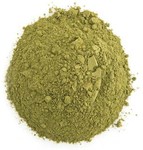It is said that one serving of matcha green tea is the nutritional equivalent of 10 cups of regularly brewed green tea. Packed with antioxidants including the powerful EGCg, matcha is said to support with boosting metabolism, burning calories and detoxification, whilst calming the mind and relaxing the body. Matcha also provides a rich source of vitamin C, selenium, chromium, zinc and magnesium. Our Organic Matcha Tea powder is grown in the mountains of North Eastern Jiangxi Province of China.
Organic Green Matcha Tea Powder $16.25 for 250g or $64.90/kg + Shipping from $9.95 @ Affordable Whole Foods
Last edited 21/01/2020 - 11:09 by 1 other user
Related Stores
closed Comments

😂it possibly was…

Would advise people to go for Japanese matcha instead of the Chinese one.

Why is that, different plant, different process?

Google it http://www.matcha.my/Blog/japan-vs-china-matcha-comparison
there are many more comparisions.
Just try OP's and find out.
Japanese Matcha is considered a higher quality tea due to the laborious growth processes and this is also reflected in the price difference with the Japanese being much more expensive. In Japan, Matcha is generally grown in the shade which means increased chlorophyll content and other nutrients and also a slightly less bitter flavour as there are less tannins.
In saying that, Chinese Matcha still has a dense nutrient profile with an earthy flavour that has a similar bitterness to regular green tea. It's great to add to smoothies, bliss balls or raw slices and is inexpensive compared to most of what is on the market.

where is the bargain please? or its pure advertising?

The problem is not the tea itself, the soil in China has high metal pollutions. Even fruits and veggies are the same. Some growers uses metal wastes on growing grounds.

Toxic pollutions or radiation. Choose your poison.😁

You mean from japan? Not the whole country are affected , you can check carefully before you buy.lots of region grows matcha.

And same goes with China, not whole country has high metal pollutions
https://journals.plos.org/plosone/article?id=10.1371/journal…
OP says, North Eastern Jiangxi Province, which is clear. Now OP should give us more discounts ;)

@boomramada: Thanks but no thanks, even if it is free.
https://en.m.wikipedia.org/wiki/2013_Eastern_China_smog
Don’t tell me the air pollution doesn’t affect the plants.

@afrowan: LOL
During the winter, air pollution in Japan is particularly bad since the polluted air comes not only from industrial and vehicle emissions within Japan, but also from polluted air masses that are derived from China
https://www.world-weather-travellers-guide.com/air-pollution…

@boomramada: then japan will still be my pick, at least the soil is less toxic.although i don't drink matcha.

@afrowan: All this discussion is for nothing?? FYI , 30g of Japanese matcha is like $20 vs $60 per kg Chinese.
If they both the same price, for sure Japanese.
Most of us just use them for dessert and add tons of sugar.
More chance of having health issue thanks to sugar than .00001% pollutant in it. LOL
@boomramada: it is ozbargain, people need to know the risks to consider if it is worth as a bargain or not.
For child under 12 shouldn't take any of these with desserts, high level metals could affect their brains to develop, slow reaction and learning etc. for more details you can ask a doctor.

No mention of the grade …. can only assume its of the lower end, maybe catering/culinary.

Health Warning!
Drinking green tea is POSSIBLY UNSAFE when consumed for a long time or in high doses (more than 8 cups per day). Drinking large amounts of green tea might cause side effects due to the caffeine content. These side effects can range from mild to serious and include headache, nervousness, sleep problems, vomiting, diarrhea, irritability, irregular heartbeat, tremor, heartburn, dizziness, ringing in the ears, convulsions, and confusion. Green tea also contains a chemical that has been linked with liver injury when used in high doses.
https://www.webmd.com/vitamins/ai/ingredientmono-960/green-t…

Too much caffeine is a thing?

Green tea is POSSIBLY UNSAFE when taken by mouth long-term or in high-doses. It can cause side effects because of the caffeine. These side effects can range from mild to serious and include headache, nervousness, sleep problems, vomiting, diarrhea, irritability, irregular heartbeat, tremor, heartburn, dizziness, ringing in the ears, convulsions, and confusion. Green tea seems to reduce the absorption of iron from food. Drinking very high doses of green tea is LIKELY UNSAFE and can actually be fatal. The fatal dose of caffeine in green tea is estimated to be 10-14 grams (150-200 mg per kilogram). Serious toxicity can occur at lower doses.
source: https://www.rxlist.com/green_tea/supplements.htm
The American College of Gastroenterology released guidelines on drugs and herbal supplements that can cause liver injury. Topping the list of herbals? You guessed it: green-tea extract. Some pills, they note in the press release, can contain more than 700 milligrams (mg) of catechins (the active compound in green tea), whereas a cup of green tea contains 50 to 150 mg, and people tend to take these pills multiple times a day.
source: https://www.womenshealthmag.com/health/a19966040/green-tea-e…
The culprit is a type of polyphenols called catechins. While catechins are antioxidants, it is possible to have too much of a good thing-and this one can be deadly. Catechins target mitochondria-the powerhouses of your cells-and prevent them from being able to help your body metabolize food and turn it into energy, which can lead to jaundice, hepatitis, or liver failure, says Herbert Bonkovsky, M.D., a gastroenterologist with the Carolinas HealthCare System and one of the authors of the study.
source: https://www.womenshealthmag.com/health/a19966040/green-tea-e…
While the catechin content of green tea infusions and similar drinks are generally safe there may be health concerns when taken as a food supplement, says a report from the European Food Safety Authority (EFSA).
In 2016, the Norwegian food safety authority Mattilsynet warned against green tea extract supplements following reports of liver damage. The authority pointed to high levels of the active substance EGCG (epigallocatechin-3-gallate) in the products, which were far above that obtained from just drinking green tea.
https://www.nutraingredients.com/Article/2018/04/19/EGCG-war…
I did my best. I'll leave the rest to the natural selection.

The warning for soft drinks posts should then probably three sizes of this.

more than 8 cups per day
LoL seriously? not just green tea, at that level even 8 cup of water is bad for you.

Today, the NAM recommends letting thirst guide your water consumption habits but set an even higher volume of total daily water intake: 3.7 liters (15 cups) for the average adult male and 2.7 liters (11 cups) for the average adult female.
https://www.onemedical.com/blog/live-well/daily-water-intake…


Good job on owning the marketing! Was it a wise man by any chance?
;p